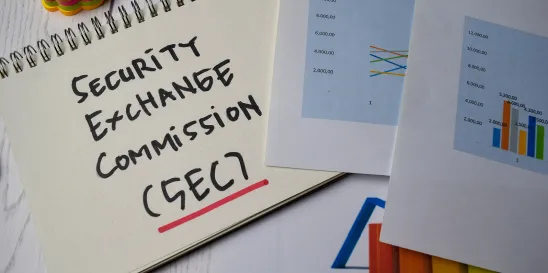On January 10, 2024, the Securities and Exchange Commission ("SEC") issued an order approving the applications of 11 different spot Bitcoin exchange‑traded products (the "Approved ETPs") to each list and trade their shares on a national securities exchange.[1] As a result, each Approved ETP is expected to commence trading on either the NYSE Arca, Inc., The Nasdaq Stock Market LLC, or Cboe BZX Exchange, Inc. The SEC Order represents the first time that the SEC has permitted the listing of an exchange‑traded product ("ETP") that invests directly in a cryptocurrency — here, Bitcoin ("spot crypto ETPs").
Background
The order is an important development for both asset managers and the crypto industry. Before the SEC Order, the only cryptocurrency‑related ETPs that the SEC had permitted to trade on national securities exchanges were those that invested primarily in cryptocurrency‑derived futures ("crypto futures ETPs"), rather than cryptocurrencies acquired directly on the spot market. Mutual funds and exchange‑traded funds ("ETFs") have been (and remain) similarly limited.[2]
In rejecting prior listing applications for spot crypto ETPs, the SEC cited concerns regarding whether the rules of the exchanges on which such ETPs were proposed to be listed were adequately "designed to prevent fraudulent and manipulative acts and practices" as is required under the Securities Exchange Act of 1934 (the "Exchange Act"). Spot crypto ETPs have attempted to satisfy this requirement by asserting that the exchange in question had a comprehensive surveillance‑sharing agreement with a "regulated market of significant size" related to the underlying cryptocurrency assets (most typically for spot Bitcoin ETPs, the Chicago Mercantile Exchange's ("CME") Bitcoin futures market). The SEC rejected these arguments on the basis that applicants failed to demonstrate that the CME constitutes a regulated market of sufficient size for these purposes (the so‑called "significant market test").
In August 2023, the U.S. District of Columbia Court of Appeals ("DC Circuit") issued an order vacating the SEC's rejection of the listing application for Grayscale Bitcoin Trust ("GBTC") and remanded the matter to the SEC for further consideration.[3] The Court held that the SEC's rejection of spot Bitcoin ETP applications such as GBTC's was arbitrary and capricious in view of the fact that the SEC had permitted Bitcoin futures ETPs to be listed, that such Bitcoin futures ETPs functioned similarly enough to spot Bitcoin ETPs that they appeared to be entitled to similar regulatory treatment, and that the SEC had failed to provide a reasonable and coherent explanation of the difference in its treatment of spot Bitcoin ETPs compared to Bitcoin futures ETPs.
It is fair to surmise, however, that the SEC's failure to approve spot crypto ETPs' listing applications was not capricious, but instead evidenced a policy determination to prevent the widespread exposure of retail investors to cryptocurrencies that the public trading of spot crypto ETPs would facilitate. The SEC had already effectively limited registered funds to obtaining exposure to cryptocurrencies through the futures market[4] and appears to have sought to extend this limitation to unregistered spot crypto ETPs by refusing to permit exchanges to list them. The line drawn by the SEC for ETPs that seemed rational under the Investment Company Act of 1940 (the "Investment Company Act") given the investor protection issues in play (custody, liquidity, pricing, etc.) may not appear rational under the exchange listing standards applicable under the Exchange Act.
The SEC Order
Last week, almost five months after the DC Circuit issued its opinion, the SEC changed its mind and approved the listing orders. The Commission, on a 3‑2 vote, concluded that there was a sufficient correlation between prices on the spot Bitcoin market and those of Bitcoin futures traded on the CME that the CME could reasonably be able to surveil for market manipulation and fraud. The SEC Order also noted that existing regulation under the Investment Advisers Act of 1940 (the "Advisers Act") and Regulation BI under the Exchange Act, will apply to market intermediaries that recommend investments in spot crypto ETPs, which will further protect retail investors from the risks associated with Bitcoin.
Commissioner Crenshaw dissented, agreeing with the DC Circuit that the SEC, like other administrative agencies, must treat like cases alike, but arguing that there were important differences between direct investments in Bitcoin on the spot market and Bitcoin‑derived futures that implicated investor protections. She asserted that investments in futures contracts have a primary regulator, unlike the spot market for Bitcoin, which she described as an "unregulated, fragmented, continuously traded, global free‑for‑all. . . much [of which] could be beyond the reach of U.S. regulation." She pointed out that even if the CME could detect fraud or manipulation in the spot Bitcoin market, neither it nor the SEC may have authority to do anything about it. She expressed particular concern that shares of spot Bitcoin ETPs will find their way into IRAs and other retirement plans.
Chair Gensler, in his statement supporting the order, pointed out that retail investors could already invest directly in Bitcoin on the spot market in various ways, including through payment apps, without any investor protections. Investors in spot Bitcoin ETPs, he asserted, would have better access to disclosure about the risks of their investments and the protections of the securities laws regulating broker‑dealers and investment advisers, which address conflicts of interest.
Impact on Investment Managers
The SEC Order is significant for sponsors of registered investment companies, which will be able to offer spot Bitcoin ETPs side‑by‑side with their registered exchange‑traded funds. The ETPs will provide retail investors a more convenient way to access the cryptocurrency market and are anticipated to broaden investor participation in these markets. Because there is a fixed amount of Bitcoin available, any appreciable increase in demand should translate to an increase in valuation of Bitcoin. Indeed, the market for Bitcoin began to appreciate in anticipation of the SEC Order.
There are still issues left unaddressed by the SEC Order that will confront spot crypto ETP sponsors, including:
- Will the SEC issue orders approving the listing of spot crypto ETPs that invest in Ethereum or other cryptocurrencies? Critical to the SEC's decision would seem to be whether the agency will want to conclude, as it has with respect to Bitcoin, that a particular cryptocurrency is not a security and thus would also not be subject to the Investment Company Act. To date, it has been reluctant to do so, and we expect that reticence to continue. If it does not approve the use of other cryptocurrencies, it may provide Bitcoin with a monopoly on access to a large part of the retail market that seeks exposure to cryptocurrencies.
- Will registered funds, which largely have been limited to obtaining exposure to Bitcoin through futures, begin investing in shares of spot Bitcoin ETPs, subject to Investment Company Act ownership limitations and sorting out any relevant tax issues?
- Will advisers, trust departments and other fiduciaries get comfortable recommending individual clients allocate a portion of their portfolios in spot Bitcoin ETPs?
- What amount of management fees and expenses can be charged to investors, and will sponsorship of spot Bitcoin ETPs be profitable? Almost immediately after the SEC Order was issued, some sponsors began promoting a temporary waiver of all fees for at least a limited period.
- Given their greater liquidity and lower fees, will institutional investors gravitate to the spot Bitcoin ETP and away from existing private crypto fund structures and will those private crypto fund managers likely focus on other cryptocurrencies or a portfolio of multiple cryptocurrencies?
- While the SEC will not have examination authority of Bitcoin ETPs (they are not investment companies), the agency will have authority to examine the ETPs' advisers, which are all likely to be registered under the Advisers Act. What will examiners of spot Bitcoin ETPs expect of their advisers as well as those advisers that recommend clients invest in such ETPs? These advisers should anticipate that compliance matters relating to investments in or the management of spot Bitcoin ETPs will likely be subject to heightened SEC scrutiny for at least the near future.
[1] See Order Granting Accelerated Approval of Proposed Rule Changes, as Modified by Amendments Thereto, to List and Trade Bitcoin‑Based Commodity‑Based Trust Shares and Trust Units, Release Nos. 34‑99306, SR‑NYSEARCA‑2021‑90; SR‑NYSEARCA‑2023‑44; SR‑NYSEARCA‑2023‑58; SR‑NASDAQ‑2023‑016; SR‑NASDAQ‑2023‑019; SR‑CboeBZX‑2023‑028; SR‑CboeBZX‑2023‑038; SR‑CboeBZX‑2023‑040; SR‑CboeBZX‑2023‑042; SR‑CboeBZX‑2023‑044; SR‑CboeBZX‑2023‑072 (January 10, 2024) (the "SEC Order").
The Approved ETPs are: (1) ARK 21Shares Bitcoin ETF, (2) Bitwise Bitcoin ETF, (3) Franklin Bitcoin ETF, (4) Fidelity Wise Origin Bitcoin Fund, (5) Grayscale Bitcoin Trust, (6) Hashdex Bitcoin ETF, (7) Invesco Galaxy Bitcoin ETF, (8) iShares Bitcoin Trust, (9) Valkyrie Bitcoin Fund, (10) VanEck Bitcoin Trust, and (11) WisdomTree Bitcoin Fund.
[2] Staff Statement on Funds Registered Under the Investment Company Act Investing in the Bitcoin Futures Market, Division of investment Management Staff, U.S. Securities and Exchange Commission (May 11, 2021) (the "2021 Staff Letter").
[3] Grayscale Investments, LLC v. SEC, Docket No. 22‑01142 (D.C. Cir. Aug. 2023) (the "DC Circuit Opinion").
[4] 2021 Staff Letter and Dalia Blass, Director, Division of Investment Management, U.S. Securities and Exchange Commission, Letter to Paul Schott Stevens, President & CEO, Investment Company Institute and Timothy W. Cameron, Asset Management Group – Head, Securities Industry and Financial Markets Association (Jan. 18, 2018).




 />i
/>i

